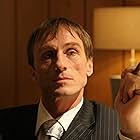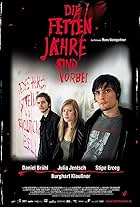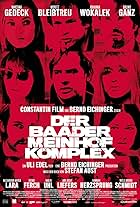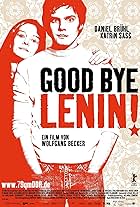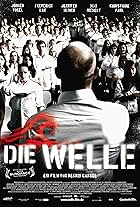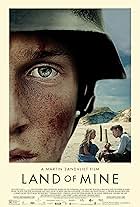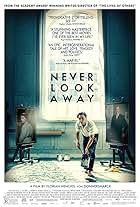IMDb RATING
7.6/10
29K
YOUR RATING
A dramatization of the final days of Sophie Scholl, one of the most famous members of the German World War II anti-Nazi resistance movement, The White Rose.A dramatization of the final days of Sophie Scholl, one of the most famous members of the German World War II anti-Nazi resistance movement, The White Rose.A dramatization of the final days of Sophie Scholl, one of the most famous members of the German World War II anti-Nazi resistance movement, The White Rose.
- Nominated for 1 Oscar
- 22 wins & 13 nominations total
- Director
- Writer
- All cast & crew
- Production, box office & more at IMDbPro
Storyline
Did you know
- TriviaThe Stadelheim prison in Munich's Giesing district, where the execution of Sophie Scholl and many others (at least 1,035) took place during the Third Reich, is still in use as a prison as of 2014. Adolf Hitler had also been imprisoned here for a month in 1922.
- GoofsDuring his interrogation at trial, Hans Scholl defiantly states that he has served on the Eastern Front and that Judge Roland Freisler has not. Freisler then appears to be taken aback and momentarily silent. In actuality, Freisler was a veteran of the Eastern Front during World War I, saw significant combat, and was wounded and captured. Thus, his demeanor at Hans' statement is somewhat odd.
- Quotes
Sophie Magdalena Scholl: [to the court] You will soon be standing where we stand now.
- ConnectionsReferenced in The Making of 'Sophie Scholl - Die letzten Tage' (2005)
Featured review
Sophie Scholl, at one point of her trial, tells the judge and his cronies, as well as the audience of cowards attending the proceedings, that soon they all will be seating in the place she is now occupying. History proved her right as most of the same people that condemned her for treason were proved to be the real traitors.
Marc Rothemund, the director, working on Fred Beinersdorfer's screen play, presents us with a courageous figure, Sophie Scholl, who saw the atrocities the Third Reich was doing to her country and dared to speak about it when confronted by the regime.
Sophie was part of the student's organization, White Rose, that wanted to inform the German people about facts that were never challenged by anyone because of the consequences such action would mean for whoever spoke the truth. Sophie and her brother were instrumental for several pamphlets informing the population about things that the regime's propaganda didn't tell the German people. Sophie mentioned the unmentionable, the extermination of the Jews, and even the elimination of sick children by people gone mad.
The main part of the film involves the interrogation Robert Mohr subjects Sophie as soon as she is arrested. In their exchange Sophie shows an amazing courage and never is seen as being scared of what will happen to her. After she admits to the charges, even Mohr seems to be amazed by her intelligence and resolve.
Julia Jentsch is the main reason for seeing this movie. Ms. Jentsch gives a luminous performance as the woman who challenged the higher ups in charge of her country. Gerald Alexander Held, who is seen as Robert Mohr, makes an impression as the man who questions Sophie's motives and tries to break her spirit. Johanna Gastdorf is seen as the kind Else, who shares a cell with Sophie.
"Sophie Scholl" is an intelligent film that shows a talented director, Marc Rothemund, and a bright young star of the German cinema, Julia Jentsch, in a film about courage and decency during a crazy time where all hope seemed to have disappeared from Germany.
Marc Rothemund, the director, working on Fred Beinersdorfer's screen play, presents us with a courageous figure, Sophie Scholl, who saw the atrocities the Third Reich was doing to her country and dared to speak about it when confronted by the regime.
Sophie was part of the student's organization, White Rose, that wanted to inform the German people about facts that were never challenged by anyone because of the consequences such action would mean for whoever spoke the truth. Sophie and her brother were instrumental for several pamphlets informing the population about things that the regime's propaganda didn't tell the German people. Sophie mentioned the unmentionable, the extermination of the Jews, and even the elimination of sick children by people gone mad.
The main part of the film involves the interrogation Robert Mohr subjects Sophie as soon as she is arrested. In their exchange Sophie shows an amazing courage and never is seen as being scared of what will happen to her. After she admits to the charges, even Mohr seems to be amazed by her intelligence and resolve.
Julia Jentsch is the main reason for seeing this movie. Ms. Jentsch gives a luminous performance as the woman who challenged the higher ups in charge of her country. Gerald Alexander Held, who is seen as Robert Mohr, makes an impression as the man who questions Sophie's motives and tries to break her spirit. Johanna Gastdorf is seen as the kind Else, who shares a cell with Sophie.
"Sophie Scholl" is an intelligent film that shows a talented director, Marc Rothemund, and a bright young star of the German cinema, Julia Jentsch, in a film about courage and decency during a crazy time where all hope seemed to have disappeared from Germany.
- How long is Sophie Scholl: The Final Days?Powered by Alexa
Details
- Release date
- Country of origin
- Official sites
- Language
- Also known as
- Sophie Scholl
- Filming locations
- Ludwig Maximillian University, Munich, Bavaria, Germany(university hall)
- Production companies
- See more company credits at IMDbPro
Box office
- Gross US & Canada
- $680,331
- Opening weekend US & Canada
- $17,310
- Feb 19, 2006
- Gross worldwide
- $10,804,315
- Runtime2 hours
- Color
- Sound mix
- Aspect ratio
- 1.85 : 1
Contribute to this page
Suggest an edit or add missing content

Top Gap
By what name was Sophie Scholl: The Final Days (2005) officially released in India in English?
Answer
















